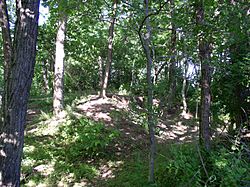Rowlandton Mound Site facts for kids

Rowlandtown Mound with pit dug by archaeologists
|
|
| Location | Paducah, Kentucky, McCracken County, Kentucky, |
|---|---|
| Region | Jackson Purchase |
| Coordinates | 37°5′42.07″N 88°38′11.29″W / 37.0950194°N 88.6364694°W |
| History | |
| Founded | 1100 CE |
| Abandoned | 1350 CE |
| Cultures | Mississippian culture |
| Site notes | |
| Excavation dates | 2006 |
| Archaeologists | Dr. Kit Wesler |
| Architecture | |
| Architectural styles | Platform mound |
| Responsible body: private | |
The Rowlandton Mound Site is an ancient place in Paducah, Kentucky. It was once home to people from the Mississippian culture. These people lived here a very long time ago, between about 1100 and 1350 CE (Common Era). This site has a large dirt mound and a village area. It is located near an old oxbow lake, which is a U-shaped lake formed when a river changes its path. The site is in McCracken County, Kentucky, close to the Ohio River.
Discovering the Rowlandton Mound Site
The Rowlandton Mound Site is about 3 hectares (7.4 acres) big. That's like the size of several football fields! The most important part of the site is a large platform mound. A platform mound is a big, flat-topped hill made by people. These mounds were often used for important buildings or ceremonies. The site also includes an area where a village once stood. It is similar in size to the Wickliffe Mounds Site, another important ancient place in western Kentucky.
Who Lived at Rowlandton Mound?
For a while, experts thought that big sites like Rowlandton Mound were just part of a larger group of towns. They believed these towns were connected to the Kincaid Mounds in nearby Southern Illinois. However, new discoveries changed this idea.
In 2006, archaeologists led by Dr. Kit Wesler from Murray State University dug up parts of the site. Their work showed that Rowlandton Mound and other similar sites were likely started by local people. These people were from the Woodland period, which came before the Mississippian culture. This means the communities grew on their own, rather than being built by people from far away.
 | Isaac Myers |
 | D. Hamilton Jackson |
 | A. Philip Randolph |


